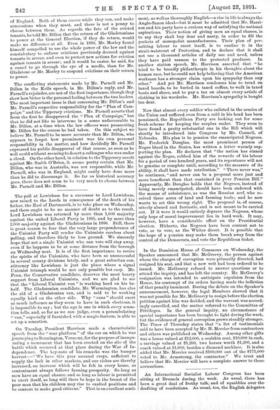The conflicting statements made by Mr. Parnell and Mr. Dillon
in the Bells speech, in Mr. Dillon's reply, and Mr. Parnell's rejoinder, are not of the first importance, though they show how bitter is the personal feeling between the two leaders. The most important issue is that concerning Mr. Dillon's and Mr. Parnell's respective responsibility for the "Plan of Cam- paign" and the Tipperary evictions. Mr. Parnell asserts that from the first he disapproved the " Plan of Campaign," but that he did not like to intervene in a sense unfavourable to Mr. Dillon, at a time when the law officers were prosecuting Mr. Dillon for the course he had taken. On this subject we believe Mr. Parnell to be more accurate than Mr. Dillon, who appears to forget how prominent was his own personal responsibility in the matter, and how decidedly Mr. Parnell expressed his public disapproval of that course, as soon as he well could without seeming to desert a colleague who was under a cloud. On the other hand, in relation to the Tipperary revolt against Mr. Smith O'Brien, it seems pretty certain that Mr. Dillon, who was in Australia, was not responsible, while Mr. Parnell, who was in England, might easily have done more than he did to discourage it. So far as historical accuracy goes, there does not seem to be very much to choose between Mr. Parnell and Mr. Dillon.


































 Previous page
Previous page